Prince Vseslav The Sorcerer And Werewolf – The Most Famous Ruler Of Polotsk
Ellen Lloyd - AncientPages.com - Born around 1029 in Belarus, Prince Vseslav was an intriguing individual who became a famous ruler of Polotsk and Grand Prince of Kiev in 1068–1069.
Prince Vseslav's Supernatural Powers
Nicknamed Prince Vseslav the Sorcerer, the man was credited with having supernatural powers. His successful struggles to achieve goals gave rise to a legend that he had been born with a magical and enchanting birthmark on his head.
Vseslav of Polotsk. Painting by Belarusian painter Jazep Drazdovic (1923). Credit: Public Domain
The rumor that he always wore a headband that covered the mark added more credibility to these unusual stories. Even more incredible accounts tell Prince Vseslav of Polotsk was a werewolf capable of moving at superhuman speeds.
Ancient people believed that "those born with a birthmark, wolfish tufts of hair, or a caul on their head" were werewolves. 1
"In mythologies of ancient cultures, the werewolf was known under different names such as Slavic' vulcolaca', Polish wilkołak, Roman varcolac, and Greek mythology mentions' vrykolokas. In eighteenth-century French folklore, a monstrous creature known as the Beast of Gevaudin terrified the countryside between 1764 and 1767. It looked like a long-legged, shaggy-coated hyena (a werewolf) with glowing eyes and was credited with the deaths of at least 100 people.
The werewolf's name may vary, but its characteristics remain the same. However, a werewolf creature exceeds wolves' strength, speed, readiness, and sensory perception. After the shapeshifting process, the werewolf is much more animal than human, although it is possible that this keeps many of its fundamental characteristics such as (knowledge, wisdom, and personality) intact." 2
Many Slavic legends speak of warriors having an ability to turn into wolves, but that can only be achieved by an individual of the highest level of personal development. Credit: Adobe Stock - breakermaximus
The exciting story of Prince Vseslav's alleged werewolf behavior was mentioned in the first ancient Rus work of literature, an anonymous epic poem known as The Tale of Igor's Campaign. The account informs that "Prince Vseslav was a judge to his subjects, was a ruler to his cities; but at night he would race like a wolf to Kiev. If the morning bells of St. Sophia rang in Polotsk, he could hear the peal in Kiev".
Prince Vseslav's Struggles To Stay In Power
Of course, Prince Vseslav would not have been remembered as a great ruler for only his supernatural shapeshifting abilities. He was a determined warrior who could not accept being defeated. In 1044, as a senior member of the Rurik Dynasty, he became the Prince of Polotsk and Vitebsk. Continuing his father's policy of subjugating other lands, he attacked Novgorod in 1066 and demonstrated his power.
It was a bloody battle during which many were killed and imprisoned. To "humiliate the vanquished enemy, the bells of St. Sophia cathedral in Novgorod were removed and melted down." 3
One year later, Prince Vseslav's forces were defeated by Grand Prince Izyaslav of Kiev and his brothers Svyatoslav and Vsevolod at the river Nemega. There were many casualties in this horrible battle, and as told in The Tale of Igor's Campaign, "The bloody banks of the Nyamiha were sown with Russian bones."
Prince Vseslav was arrested, imprisoned, and he lost Polotsk.
As Lobov Bazan explains in the informative book A History of Belarus,
"According to the traditions of the times, the Kiev princes regularly ravaged the Polotsk lands following this victory. Vseslav the Sorcerer understood that the future independent existence of his principality was in grave danger, and he sent a message to Izyaslav of Kiev to ask for peace.
Statue of Prince Vseslav. Credit: Adobe Stock - sikaraha
The Prince of Kiev was not about to forgive the unruly vassal, but knowing the uniqueness of Vseslav's personality and his popularity among the people, he decided to destroy him with cunning trickery. Izyaslav promised to make peace with Veslav and even to return all of the lands he had captured if Vseslav would come to Kiev to ask for this in person.
The Prince of Kiev vowed to cause him no harm and kissed a cross publicly. Believing in Izyaslav's integrity, Vseslav and his two sons traveled to Izyaslav. They were immediately arrested, shackled, and imprisoned. The situation appeared hopeless. The Principality of Polotsk had not only lost its independence but the entire dynasty of Prince Vseslav the Sorcerer was threatened with destruction.
However, keeping with the Russian proverb, "Man proposes, and God disposes!" Vseslav the Sorcerer was not killed immediately; he was imprisoned for over a year. Perhaps the cross that Izyaslav used to swear that he would not harm Vseslav actually saved him. It was with good reason that he was called Vseslav the Sorcerer." 3
The political situation was unstable, and during the Kievan rebellion of 1068, an angry, dissatisfied crowd with Izyaslav's cruelty and oppression managed to free Vseslav from prison. He was seen as a wise ruler and was popular among the lower classes. In 1071, seven years later, after many battles with Izyaslav, Vseslav managed to secure Potolsk again.
"Polotsk was in a hostile environment. The city was occupied and looted. Twice Vladimir Monomakh succeeded in ousting Vseslav the Sorcerer from the Polotsk throne, only for him to return time after time thanks to the support of his people." 3
To the sorrow of the residents of Polotsk and the relief of Kiev, Prince Vseslav died in 1101.
"Clearly, the rich, powerful and sovereign Principality of Polotsk was a constant headache to the Grand Princes of Kiev. The fact that the Vseslav the Sorcerer's undertakings were at the forefront of Kiev's concerns is attested to in a record in the chronicles ing his death: "In the year 6609 (1101 AD), on Wednesday the fourteenth day of the month of April, at nine o'clock in the morning, Prince Vseslav of Polotsk was laid before the eyes of God." Such chronological accuracy is never encountered for other princes.
Even if the Kievan princes did not look upon this news with elation, they were doubtlessly relieved." 3
Prince Vseslav, the mighty ruler with an excellent reputation for sorcery and witchcraft, left behind six sons, and the Polotsk lands were divided amongst them.
Written by Ellen Lloyd – AncientPages.com
Updated on February 5, 2024
Copyright © AncientPages.com All rights reserved. This material may not be published, broadcast, rewritten or redistributed in whole or part without the express written permission of AncientPages.com
Expand for references- Roy Willis Ph.D. - World Mythology
- Sutherland - Werewolf – Ancient Worldwide Belief In Terrible Curse, AncientPages.com
- Lubov Bazan - A History Of Belarus: A Non-Literary Essay That Explains The Ethnogenesis Of The Belarusians
- Farrell, D. E. (1993). Shamanic Elements in Some Early Eighteenth Century Russian Woodcuts. Slavic Review, 52(4), 725–744.
More From Ancient Pages
-
 Mysterious Denisovans – New Study Offers New Evidence
Fossils | Mar 25, 2021
Mysterious Denisovans – New Study Offers New Evidence
Fossils | Mar 25, 2021 -
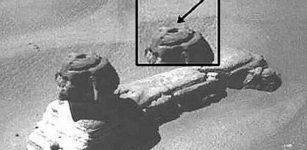 Head Of The Great Sphinx Was Changed – It’s The Gateway To A Secret Underground City– Historians Suggest
Featured Stories | Jan 20, 2018
Head Of The Great Sphinx Was Changed – It’s The Gateway To A Secret Underground City– Historians Suggest
Featured Stories | Jan 20, 2018 -
 On This Day In History: SS City of Glasgow Leaves Liverpool And Is Never Seen Again – On March 1, 1854
News | Mar 1, 2017
On This Day In History: SS City of Glasgow Leaves Liverpool And Is Never Seen Again – On March 1, 1854
News | Mar 1, 2017 -
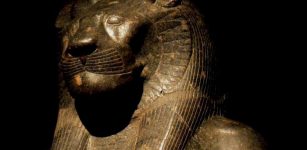 66 Diorite Statues Of Lion-Headed Goddess Sekhmet Discovered In Luxor, Egypt
Archaeology | Mar 9, 2017
66 Diorite Statues Of Lion-Headed Goddess Sekhmet Discovered In Luxor, Egypt
Archaeology | Mar 9, 2017 -
 Riddle Of An Ancient Underground City No-One Thinks Exist – Symbol For A Spiritual Quest – Part 2
Featured Stories | Sep 18, 2019
Riddle Of An Ancient Underground City No-One Thinks Exist – Symbol For A Spiritual Quest – Part 2
Featured Stories | Sep 18, 2019 -
 On This Day In History: Anders Celsius, Swedish Astronomer And Mathematician Was Born – On Nov 27, 1701
News | Nov 26, 2016
On This Day In History: Anders Celsius, Swedish Astronomer And Mathematician Was Born – On Nov 27, 1701
News | Nov 26, 2016 -
 Coral Castle Is Among Most Fascinating And Mysterious Buildings In Florida
Featured Stories | Sep 17, 2018
Coral Castle Is Among Most Fascinating And Mysterious Buildings In Florida
Featured Stories | Sep 17, 2018 -
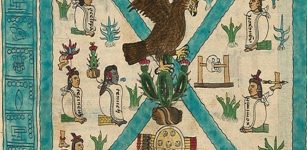 What Is The Codex Mendoza?
Ancient History Facts | Feb 14, 2016
What Is The Codex Mendoza?
Ancient History Facts | Feb 14, 2016 -
 Tower Of Babel Story As Told By The Choctaw Indians And The Cherokee
Featured Stories | May 18, 2021
Tower Of Babel Story As Told By The Choctaw Indians And The Cherokee
Featured Stories | May 18, 2021 -
 White Temple Of God Anu In Sacred Precinct Of Kullaba At Uruk
Civilizations | Oct 10, 2016
White Temple Of God Anu In Sacred Precinct Of Kullaba At Uruk
Civilizations | Oct 10, 2016 -
 Ancient Ritual Bundle From Bolivia Reveals Multiple Psychotropic Plants
Archaeology | May 7, 2019
Ancient Ritual Bundle From Bolivia Reveals Multiple Psychotropic Plants
Archaeology | May 7, 2019 -
 Ancient Alaskans Were Freshwater Fishers – Earliest Evidence Found
Archaeology | Jun 19, 2023
Ancient Alaskans Were Freshwater Fishers – Earliest Evidence Found
Archaeology | Jun 19, 2023 -
 Oxford University Is Older Than The Aztec Empire – Historical Records Say
Ancient History Facts | Dec 5, 2017
Oxford University Is Older Than The Aztec Empire – Historical Records Say
Ancient History Facts | Dec 5, 2017 -
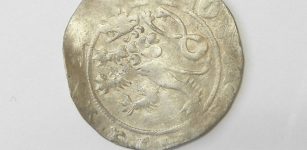 Remarkable Archaeological Discoveries Made Near Bratislava, Slovakia
Archaeology | Oct 28, 2023
Remarkable Archaeological Discoveries Made Near Bratislava, Slovakia
Archaeology | Oct 28, 2023 -
 Rock-Hewn Burial Shafts And 38 Symbolic Pots Discovered In Abusir Necropolis, Egypt
Archaeology | Feb 6, 2018
Rock-Hewn Burial Shafts And 38 Symbolic Pots Discovered In Abusir Necropolis, Egypt
Archaeology | Feb 6, 2018 -
 Unexplained Encounters With Unknown Beings In California – Old And Modern Reports
Featured Stories | Mar 11, 2024
Unexplained Encounters With Unknown Beings In California – Old And Modern Reports
Featured Stories | Mar 11, 2024 -
 Deadly Ancient Secrets Of Queen Hatshepsut’s Flacon
Artifacts | Mar 18, 2017
Deadly Ancient Secrets Of Queen Hatshepsut’s Flacon
Artifacts | Mar 18, 2017 -
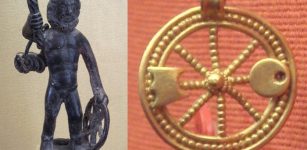 Taranis – Celtic God Of Wheel And Thunder Resembled Roman God Jupiter
Celtic Mythology | Jul 15, 2019
Taranis – Celtic God Of Wheel And Thunder Resembled Roman God Jupiter
Celtic Mythology | Jul 15, 2019 -
 Elusive Celtic Otherworld Where Tuatha Dé Danann Reside And Time Passes Slower
Celtic Mythology | Apr 7, 2018
Elusive Celtic Otherworld Where Tuatha Dé Danann Reside And Time Passes Slower
Celtic Mythology | Apr 7, 2018 -
 Controversial Study Of Ancient DNA Could Re-Write History Of South Florida And Prove Humans And Huge Prehistoric Animals Co-Existed
Archaeology | Sep 23, 2014
Controversial Study Of Ancient DNA Could Re-Write History Of South Florida And Prove Humans And Huge Prehistoric Animals Co-Existed
Archaeology | Sep 23, 2014



